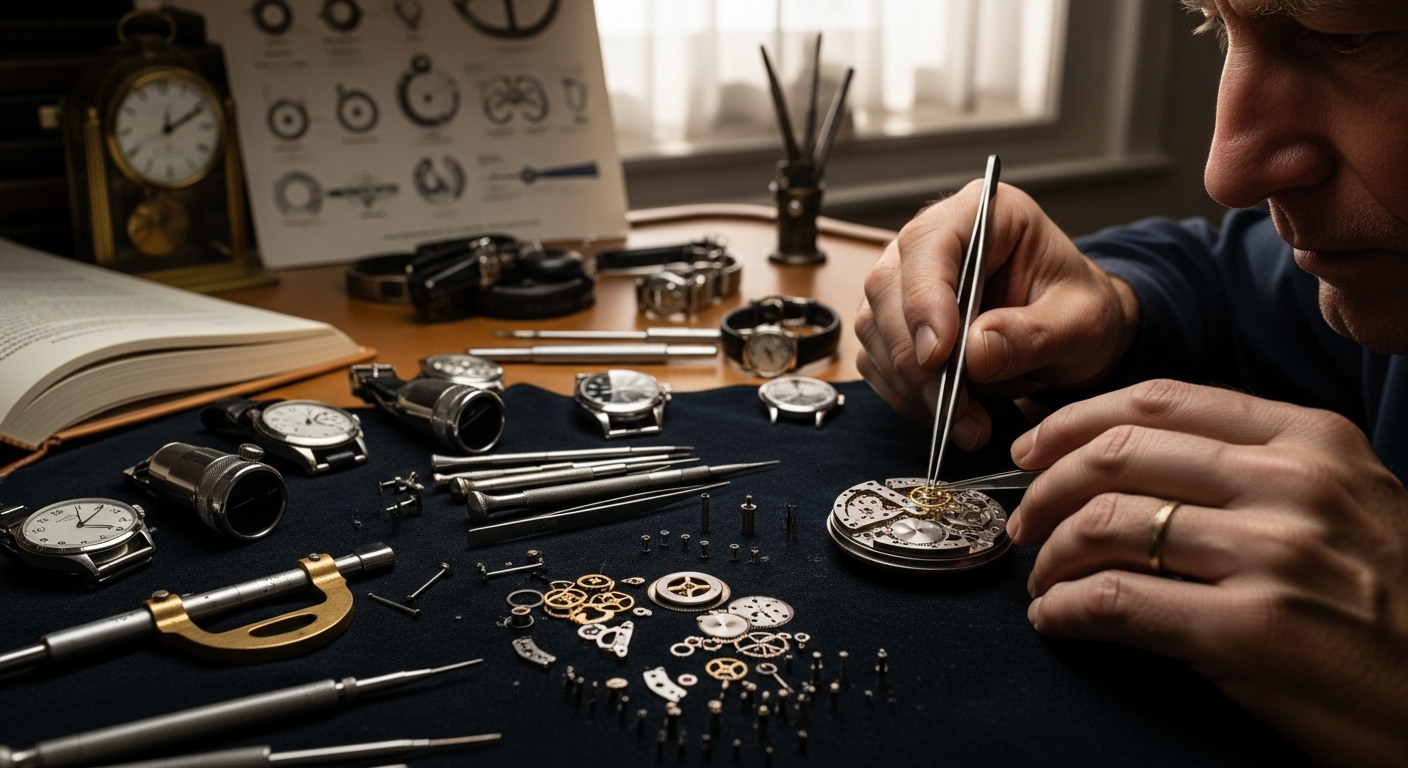The world of horology is a fascinating blend of artistry, engineering, and history. For watch enthusiasts, the pursuit of accuracy is a never-ending quest. In an age dominated by digital precision, the enduring appeal of mechanical timepieces lies in their intricate movements and the sheer dedication required to achieve remarkable accuracy. This article delves into the essential aspects of watch accuracy, offering guides and pro tips for horology fanatics looking to understand and appreciate this critical element of watchmaking. From understanding the factors that influence accuracy to practical tips for maintaining your timepieces, we’ll cover everything you need to know to navigate the world of watch accuracy.
Recent trends in the watch world indicate a renewed interest in high-accuracy mechanical watches, with brands pushing the boundaries of traditional watchmaking. Discussions in online forums and watch communities highlight the ongoing debate between quartz and mechanical movements, each offering unique advantages and challenges in terms of accuracy. Furthermore, the rise of smartwatches has introduced a new dimension to the accuracy conversation, prompting enthusiasts to explore the nuances of different timekeeping technologies. In this guide, we will explore everything from the basics to the advanced topics.
Understanding Watch Accuracy
Watch accuracy refers to how closely a timepiece measures and displays the correct time. It is typically measured in seconds per day (s/d). A watch that gains or loses a few seconds each day is considered relatively accurate, while deviations of more than 10-20 seconds per day may be considered less desirable. Several factors influence watch accuracy, including the type of movement, the quality of components, and environmental conditions.
Mechanical watches, powered by intricate systems of gears, springs, and balances, are inherently susceptible to variations in accuracy. These variations can be caused by friction, temperature changes, and the effects of gravity. Quartz watches, on the other hand, rely on the consistent oscillations of a quartz crystal to maintain accurate timekeeping. As a result, quartz watches are generally more accurate than mechanical watches, often deviating by only a few seconds per month.
However, the charm of mechanical watches lies in their complexity and craftsmanship. Watchmakers employ various techniques to enhance the accuracy of mechanical movements, including the use of high-quality materials, precise manufacturing processes, and meticulous regulation. The pursuit of accuracy in mechanical watchmaking is a testament to human ingenuity and the enduring quest for perfection.
Factors Affecting Mechanical Watch Accuracy
Several factors can influence the accuracy of a mechanical watch. Temperature changes, for example, can affect the elasticity of the balance spring and the viscosity of lubricants, leading to variations in timekeeping. Similarly, the position of the watch can impact accuracy due to the effects of gravity on the balance wheel. A watch that performs well in one position may exhibit different accuracy characteristics in another.
Magnetic fields can also disrupt the accuracy of mechanical watches by interfering with the balance spring. Many modern watches are designed with anti-magnetic components to mitigate these effects. The quality of the movement and the precision of its assembly also play a crucial role in determining overall accuracy. High-quality movements are typically more resistant to external influences and maintain more consistent timekeeping over time.
Furthermore, the age of the watch and the condition of its components can affect accuracy. Over time, lubricants can degrade, and parts can wear down, leading to increased friction and reduced precision. Regular servicing and maintenance are essential for preserving the accuracy of mechanical watches.
Quartz vs. Mechanical Accuracy A Detailed Comparison
When it comes to accuracy, quartz watches generally outperform mechanical watches. Quartz movements rely on the consistent oscillations of a quartz crystal, which vibrates at a precise frequency when subjected to an electric current. This frequency is used to measure time with remarkable accuracy. Mechanical movements, on the other hand, are subject to a variety of external influences that can affect their timekeeping performance.
While mechanical watches may not be as accurate as quartz watches, they offer a unique appeal that resonates with many watch enthusiasts. The intricate workings of a mechanical movement, the craftsmanship involved in its assembly, and the historical significance of mechanical timekeeping all contribute to their enduring popularity. Some enthusiasts appreciate the challenge of regulating a mechanical watch to achieve optimal accuracy, viewing it as a rewarding pursuit.
The choice between quartz and mechanical watches ultimately depends on individual preferences and priorities. If accuracy is the primary concern, a quartz watch is the clear choice. However, if you value craftsmanship, history, and the artistry of mechanical engineering, a mechanical watch may be more appealing.
Product Recommendation:
- AGPTEK Smart Watch for Women, 5ATM Waterproof Smartwatch for Android and iOS Phones, Fitness Tracker Watch with 100+ Sports Modes, Heart Rate Monitor Pedometer Sleep Monitor, Pink
- Casio W218H Series | Men’s Digital Watch | 50M WR | 1/100 Second Stopwatch | 100 SEC Chronograph | LED Backlight | Countdown Timer | Daily Alarm | Hourly Time Signal | 7 Year Battery
- Invicta Men’s Pro Diver Collection Coin-Edge Automatic Watch
- Stuhrling Original Mens Skeleton Automatic Dress Watch with Alligator Embossed Leather Strap Skeleton Dial
- LN LENQIN Mens Watches Stainless Steel Waterproof Analog Quartz Watch for Men with Date Luminous Fashion Wristwatch
Regulating Your Mechanical Watch for Optimal Accuracy
Regulating a mechanical watch involves adjusting the components of the movement to improve its accuracy. This process is typically performed by a skilled watchmaker using specialized tools and techniques. The goal is to minimize the watch’s deviation from the correct time, ensuring that it gains or loses as few seconds per day as possible.
The regulation process typically involves adjusting the balance spring, which controls the rate at which the balance wheel oscillates. By making small adjustments to the balance spring, the watchmaker can fine-tune the timekeeping performance of the movement. This requires a keen eye, a steady hand, and a deep understanding of the mechanics of watchmaking.
While it is possible to regulate a mechanical watch at home, it is generally recommended to entrust this task to a professional watchmaker. Incorrect adjustments can damage the movement and further compromise its accuracy. A skilled watchmaker can accurately diagnose any issues affecting the watch’s performance and make the necessary adjustments to restore it to optimal condition.
Tips and Tricks for Maintaining Watch Accuracy
Maintaining watch accuracy involves several practical steps that can help preserve the timekeeping performance of your timepiece. One of the most important is to protect your watch from extreme temperatures, which can affect the elasticity of the balance spring and the viscosity of lubricants. Avoid exposing your watch to direct sunlight or leaving it in a hot car, as these conditions can cause significant variations in accuracy.
Magnetic fields can also disrupt the accuracy of mechanical watches, so it is important to keep your watch away from strong magnets and electronic devices. Many modern watches are designed with anti-magnetic components, but it is still advisable to exercise caution. Regular servicing and maintenance are also essential for preserving watch accuracy. Over time, lubricants can degrade, and parts can wear down, leading to increased friction and reduced precision.
By following these tips and tricks, you can help maintain the accuracy of your watch and ensure that it continues to provide reliable timekeeping for years to come. Regular servicing and maintenance by a qualified watchmaker will also help prolong the life of your timepiece and preserve its value.
The Future of Watch Accuracy Innovations and Trends
The pursuit of watch accuracy is an ongoing endeavor, with watchmakers constantly exploring new technologies and techniques to improve timekeeping performance. Recent innovations include the development of new materials for balance springs and escapements, as well as the implementation of more precise manufacturing processes. These advancements are helping to push the boundaries of mechanical watch accuracy, bringing it closer to the precision of quartz timekeeping.
One notable trend is the increasing use of silicon components in mechanical movements. Silicon is a lightweight, non-magnetic material that is highly resistant to temperature changes and wear. By incorporating silicon components into the balance spring and escapement, watchmakers can significantly improve the accuracy and stability of mechanical movements.
The future of watch accuracy is likely to involve a combination of traditional craftsmanship and cutting-edge technology. Watchmakers will continue to refine the design and construction of mechanical movements, while also exploring new materials and manufacturing techniques to enhance timekeeping performance. The ultimate goal is to create timepieces that offer both exceptional accuracy and enduring beauty.
In conclusion, watch accuracy is a multifaceted topic that encompasses both the technical aspects of timekeeping and the artistry of watchmaking. Whether you are a seasoned horology fanatic or a newcomer to the world of watches, understanding the factors that influence accuracy can deepen your appreciation for these remarkable timepieces. By following the guides and pro tips outlined in this article, you can ensure that your watches continue to provide reliable and accurate timekeeping for years to come. As the watch industry continues to evolve, the pursuit of accuracy will remain a driving force, inspiring watchmakers to push the boundaries of innovation and craftsmanship. The world of watches is constantly evolving, and staying informed is key to making the most of your horological journey. Whether you prioritize accuracy, aesthetics, or historical significance, there’s a watch out there for everyone. So, embrace the passion, explore the possibilities, and continue to deepen your appreciation for the art of timekeeping.


